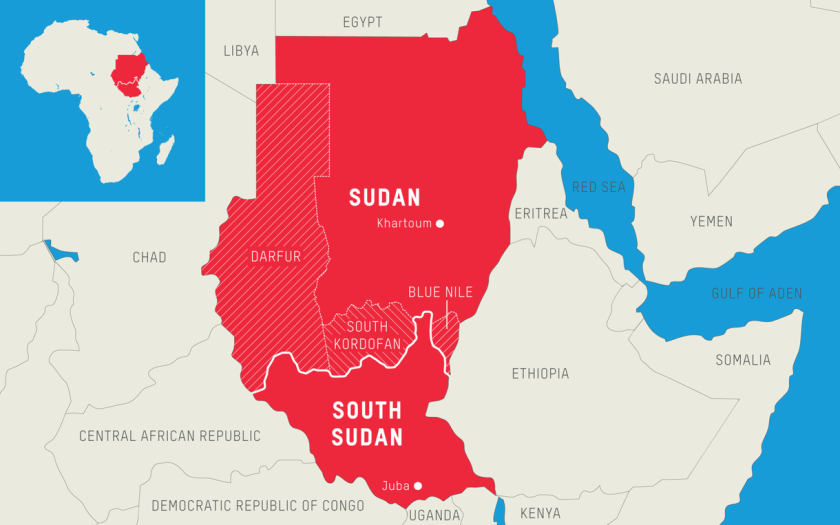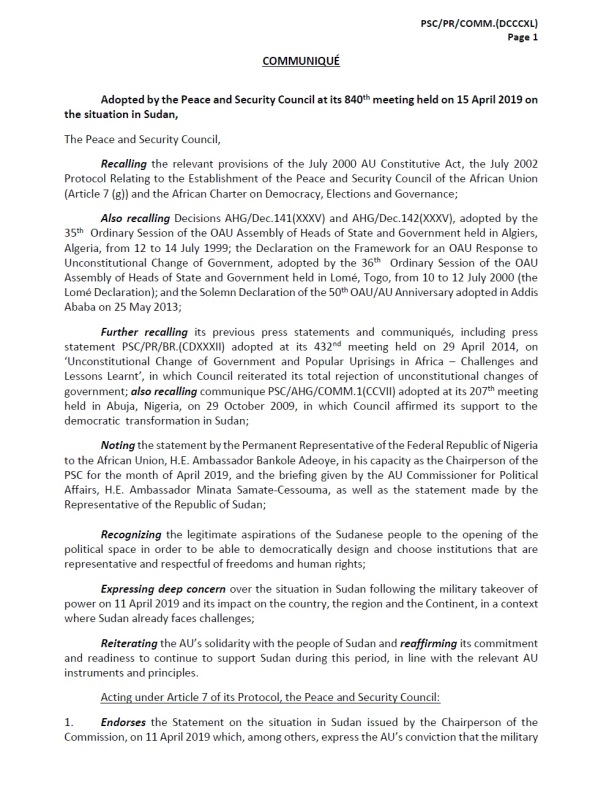
Darfur has seen significant improvements in security, with some displaced people returning home but 1.6 million remaining displaced.
NEW YORK, United States of America, April 18, 2019 – Members Echo Sudan’s Representative in Describing Recent Events as Internal Matter Not Warranting External Discussion, Interference
The planned withdrawal of the African Union-United Nations Hybrid Operation in Darfur (UNAMID) by 30 June 2020 is on track, but the political situation in Sudan has changed drastically and could affect implementation of the mission’s mandate going forward, the Joint Special Representative of the African Union and the Secretary-General for the country’s western Darfur region told the Security Council today.
Speaking via videoconference from Khartoum, where the Military Transitional Council seized power on 11 April, he said the Operation is establishing contacts and working relationships with the new authorities. The international community can also start a dialogue with the new rulers to help create a conducive environment for UNAMID’s departure and for an international follow-up engagement in Darfur, he added.
“The current situation, much as it may not be desirable, provides a chance for the Sudanese to seize the opportunity to resolve all their conflicts, including the one in Darfur,” he continued. “The Council should urge the people of Sudan to have a holistic and all-inclusive approach that is representative of all Sudanese.” Noting that the changes at the federal level have had an obvious impact on Darfur, he cited acts of violence by internally displaced persons and other protesters targeting premises associated with the previous regime. In the midst of those developments, UNAMID has remained vigilant, maintaining a particularly robust posture in Jebel Marra, where clashes between the Sudanese Armed Forces and the Sudan Liberation Army-Abdul Wahid (SLA-AW) faction have continued.
Briefing on the humanitarian situation, the Assistant Secretary-General for Humanitarian Affairs and Deputy Emergency Relief Coordinator said the direct impact of recent political events on humanitarian operations has been limited so far and regular operations have continued, including a major campaign to vaccinate children against polio and measles. However, due to the economic crisis, the prices of food and medicines are rising, with the price of sorghum 70 per cent higher than it was a year ago and imports of medicine in 2018 down by one third from 2017, she said. An estimated 5.8 million people, including 1.9 million in Darfur, are presently food-insecure, she noted, predicting that, with the lean season due to start in May, that number will increase.
On the other hand, Darfur has seen significant improvements in security, with some displaced people returning home but 1.6 million remaining displacedDarfur has seen significant improvements in security, with some displaced people returning home but 1.6 million remaining displaced, she said. Humanitarian partners are appealing for $1.1 billion to help 4.4 million of the most vulnerable people, including 2.4 million in Darfur. Noting the presence of nearly 150,000 refugees from South Sudan, she stressed that the situation in Sudan has implications for the broader region. Meanwhile, humanitarian access has improved significantly in recent years, she said, adding: “At this critical time, it is essential to ensure that the people of Darfur and the rest of Sudan receive the support they need.”
Germany’s Minister of State for Foreign Affairs and Council President for April declared: “We cannot simply delink the political developments in Khartoum from our joint work on UNAMID.” Speaking in his national capacity, he underlined the need for a collaborative relationship among the national decision-making authorities, the international community and the United Nations. “If we want to develop a way forward for the planning post-UNAMID, it is essential that we have an in-depth conversation with Sudan,” he emphasized, while pointing out the absence of a counterpart on the Sudanese side with whom to engage in dialogue.
The United Kingdom’s representative reiterated the African Union’s call for a swift return to civilian rule in Sudan, urging the Military Transitional Council to heed the voices of the people, protect protestors and uphold human rights. The representative of the United States said the upcoming strategic review of UNAMID should take into account the impact of recent events on Darfur, including the Government’s ability to protect and provide for the region’s people. If the Government cannot do that, he added, the United States is in favour of the Council considering all options.
South Africa’s representative said the people of Sudan must seize the opportunity to address their differences in an inclusive manner because Darfur’s development is linked to that of the country and the wider region. A credible and transparent transition process will help to unify the nation, he said, urging the Council to rally behind the people’s ambitions and to be guided by regional approaches through the African Union, notably the bloc’s communiqué of 15 April.
Kuwait’s representative was among speakers who emphasized that events unfolding in Sudan constitute a domestic matter in which outside entities must not interfere. China’s delegate stressed the importance of respecting the decisions made by the people of Sudan and of adhering to the principle of non-interference, in accordance with the Charter of the United Nations. The Russian Federation’s representative underlined the absence of grounds for linking the events of 11 April with UNAMID’s future.
Sudan’s representative emphasized the domestic nature of events in his country since December, saying that, in keeping with the United Nations Charter, there is no justification for the Council to discuss it. The exceptional situation calls for the greatest caution in order that all stakeholders can complete a smooth transition and democratic change, he added. He went on to reiterate his country’s commitment to respect all its agreements, including those with the United Nations regarding UNAMID’s deployment and humanitarian access.
Also speaking were representatives of the Dominican Republic, France, Peru, Côte d’Ivoire, Belgium, Poland, Indonesia and Equatorial Guinea.















